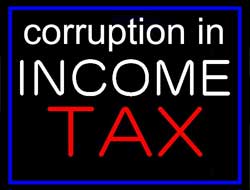In a review conducted in 2006, it was mapped out that there was a bribery projected for about Rs.496 crore for this period. Based on the summary of those conversed with, subsequent pointers arose:
- 1) It was found that there are 3.14% people who pay income tax which is about Rs331.49 lakh as of 2002-2003.
- 2) There was about 5.7% that is 91.16 crore family circle who had some communication with the department.
- 3) It was traced that 46% go to see the department at least 4 times.
- 4) It was analysed that 20.4% of those who interacted with the department had paid bribes. It was estimated that about 1.16% of total family circle paid about 24 lakh.
- 5) Bribes are paid to different people. It is found that 47% of bribes were paid right to IT staff, 28% through CAs and 15% through representatives and vendors.
Subjects of Concern
Recurrent visits:
Measures like unfinished official procedure and clearing up on paper work are the full picture for revisits. There are 37% people who reverted because of non-availability of concerned staff.
Practical difficulties:
Almost 41% of people that also includes literate people protested of monotonous paperwork.
Non-availability of systems:
Common incidence that give rise to delay and irritation.
Low level of consciousness in the midst of taxpayers:
Information has not saturated down, bring about in misperception, nervousness and lack of consciousness amongst tax payers, growing their reliance on outward sources.
Mistrust:
There is an extremely low level of trust between the taxpayer and the Income Tax Department.
Diffusion of Corruption
- 1) Almost 67% defendants who work together with the department felt that representatives were corrupt. Collectively 71% uneducated, 79% professionals and 81% high salary people felt that corruption was from head to foot.
- 2) There were about 39% of people who felt that the department lacked the importance or obligation to fight corruption.
- 3) 23% of individuals felt things are moving slowly but surely and committed levels were going up.
- 4) It was analysed that 35% found service quality of officials to be low, 36% of the people felt it was good and the rest 29% were unresponsive.
- 5) Corruption differs from place to place. It was found that 23% of the people from low income states practised corruption every time they stop at the department while only 10% in high incomes states experienced this.

Let us at this instant go conventional to some of the authorized procedures which are in place for long, to countervail powers of corruption within the system. These measures are not to charge-sheet or to take legal action but to reduce the effect of those officers who fall short of being signed up for corrupt practices. They are extensively known as 'ODI' (Officers of Doubtful Integrity) and the 'Agreed List'. These two are time-tested mechanisms to challenge clever and brainy representatives of unprofessional conduct who know the system very well and also grow the undesirable capability to daring act its feebleness. How to pledge them is the million-dollar query. Since both the time-tested measures have initiated to fall short of the 'benchmark efficiency' the prerequisite ia to challenge such elements in any Government Department, the public sensitivity about corruption for the most part in the Revenue Departments has turned into much comprehensive and confrontational. If government takes rapid act on contrary to these corrupt officers then the agonized or hurt person may with no trouble take action in contrast to these corrupt persons. The government should give some safety or assurance to the ached persons in such a way that those persons should feel full of pride upon him to complaint against such corrupt officers. And these officers should also be penalized as least for five years that they should have been to get rid of the head office or take back the public big business or cases from him.
|
Disclaimer:
This web page explains the corruptions that occured in India. The information are collected from the media reports. www.indianmirror.com or it owners do not take any responsibility for the authenticity of the contents. Since some cases are in the court of law, we do not endorse any cases or do not conclude on the same. If you need any changes to be done on the above information, kindly contact us with valid proof. However sincere attempt is being made to create awareness in the society against this evil and to prepare the younger generation for a corruption free India. |


